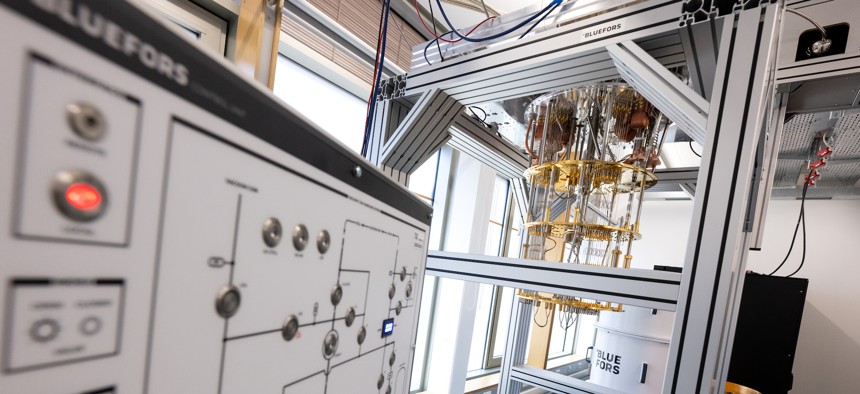IARPA launches program to solve error-prone building blocks of quantum computing

A cryostat from a quantum computer in Bavaria, Germany Sven Hoppe/Picture Alliance via Getty Images
The Intelligence Advanced Research Projects Activity will work to reduce the noise in quantum bits, which currently stand as a major hurdle to establishing fault-tolerant quantum computing.
The research arm within the Office of the Director of National Intelligence launched a new quantum computing program focused on overcoming the roadblocks preventing hardware and software innovation within the field.
Announced on Thursday by the Intelligence Advanced Research Projects Activity, the program — dubbed Entangled Logical Qubits— will study error correction methods and fault tolerance in operations between logical qubits.
Qubits serve as the fundamental unit of information processed by quantum computing systems, and, while potential abounds, physical qubits are prone to decoherence that results in incorrect computations. Error correction is therefore needed to transform these physical qubits into logical qubits — bits of information encoded and protected from external errors with help from multiple entangled physical qubits.
Securing the logical qubits could then effectively execute a quantum algorithm with significantly fewer errors than current quantum capabilities.
Without error correction measures and proper entanglement, logical qubits cannot be processed as they should. Interference, or “noise,” prevents the secure transmission of logical qubits and stands as a hurdle to the creation of a fault-tolerant quantum computer.
“To the noise and errors that plague computing with physical qubits, [universal fault-tolerant quantum computing] offers an antidote,” said ELQ Program Manager Michael Di Rosa in a press release. “IARPA’s previous quantum programs showed that the fundamentals behind UFTQC work in practice, and now we are taking the next significant step toward a UFTQC future through ELQ and its success.”
The ELQ initiative has issued research contracts to four academic institutions: ETH Zürich, Harvard University, the University of Innsbruck and the University of Sydney.
Testbeds and evaluation work will be furnished by the Air Force Research Laboratory, the Johns Hopkins University Applied Physics Laboratory and Sandia National Laboratories.
This program serves as the latest federal initiative to accelerate innovation in the quantum information and computing fields, the anticipated next chapter in computing technology.






